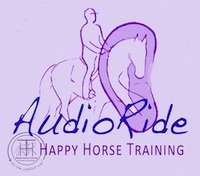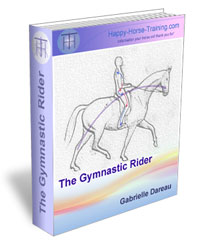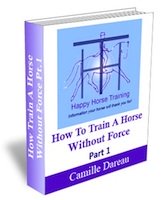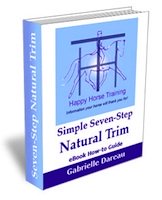|
Rescue Horses
Many horses sadly end up being unwanted and rejected by their owners. The lucky ones are rescued and the rest are put down. The bottom line is whether a horse is of use to us in some way or not. In the majority of cases this means whether a horse is rideable or not. In certain cases a horse may be rideable but not handle-able, which is equally unsatisfactory, unless the horse is marvelous in competition. 
Our society seems to rate success more by the ultimate results a rider can achieve with their horse, than by the actual transformation they have made. This is partly because it is more difficult to judge the A to B journey, but mainly because we are obsessed with the end result: whether or not, for example, we can perform a canter to walk transition, as opposed to improving the quality of the transitions when the horse is ready. It is this result-based attitude which puts riders under such pressure, which the rider often transfers onto the horse. Most people only have one horse, and that horse must come up to standard. Surely the only standard of any importance is whether or not we are enjoying ourselves and feeling good about our relationship with our horse? 
Dressage sport horses are becoming like a race apart, gladiators with phenomenal power and suppleness - but where are the riders to match this? If they existed, as is claimed, there would be no need for rollkur, water-skiing on double bridles, and savagery with spurs. If good riders existed as the rule rather than the exception, we would see the most unbelievably beautiful performances imaginable, because true engagement with an ordinary horse is beautiful enough. True engagement of a horse of the quality that exists now, should be awe inspiring. Most of the horses we have on our farm are what we would consider rescue horses, because they were suffering in some way in their previous situation. Here we have narrowed this list down, however, to those who had reached a true stale-mate in their lives. Interestingly, in each case the main reason things went so far wrong was a misunderstanding. This is good news because it means that there is hope for such horses. If we can find out what they are feeling and understand their reactions, it means we have a chance of turning their lives around and bringing out their talents. 
For us, this process is our passion, partly because it gives us the best opportunity to learn every aspect of horsemanship and improve our riding, and partly because when we give these horses a new start and a happy life, it makes us, and them feel good! Of course different horses will take on different behaviors depending on their nature, but the wrong management and training will take its toll on even the most reasonable personality. Our case history of such a horse is one we have described as an 'aggressive horse' because she was labeled as such before we took her on. These kinds of rescue horses are the exception - horses which are basically uncomplicated and talented, yet turn into monsters as a result of ignorance and narrow-mindedness. 
The third of our rescue horses has been referred to in his story as a 'nightmare horse' because by the time he had reached nine years old, he was neither rideable nor handle-able. The vicious circle of his life was again the result of a misunderstanding, the most fundamental misunderstanding of all - no one had been willing or able to recognize and accept his true identity. All of his life people had been trying to force him to be something he wasn't and he was not able to conform to their demands.
Relevant pages on Happy Horse Training that may interest you: |
New from HHT!
AudioRide is a series of exercises designed to listen to while you ride.
Audio descriptions guide you through each step of developing a balanced, dynamic connection with the horse through your position.
This truly innovative learning tool gives you a whole new way of being guided in your riding, in a calm, clear, step-by-step way.
Free Download! Introductory Exercise: Riding in the Now
Click here for full details
The Gymnastic Rider eBook
Now available exclusively from HHT! A unique, comprehensive guide to practical rider biomechanics. This professionally produced eBook takes the rider through the process of developing their body in the specific way that brings the horse's movement into harmony and balance - without force and constraint. Click here for full details, and to download the 15-page introduction for free.
Join the Happy Horse Training group on Facebook!
See and share topical info, news and photo's, and take part in lively discussions.
Click here to go to the HHT group and then click on the 'join group' button.
Join the Whole Horse Newsletter
HHT's free monthly newsletter giving you wide-ranging and intelligent insights into holistic horsemanship.
Just enter your details below to join.
Free bonus on the riding position with all new subscriptions: Ten Top Tips To Instantly Improve Your Connection With Your Horse.
Click here to see back issues of The Whole Horse newsletter
Train Your Horse
The Holistic Way
How To Train A Horse Without Force is a unique guide to training horses through energetic connection and gymnastic training. Part 1 covers everything on the ground, from handling to the lungeing technique that develops strength, straightness and engagement. Comes with a free eBook supplement on Horse Trauma.
Click here for more details.
What people say about the eBook:
"OMG! I'm BLOWN AWAY by this text [...] It's one of the best horse training texts I've ever read." - Wendy Kendall
"I realized that I haven't yet written you about the impact that your training e-book has had on me, and I want to let you know how inspiring and helpful I found it. As a student of Zen Buddhism for nearly three decades, I've often wondered when someone was going to write the book on Zen and the art of horsemanship, and I think that your emphasis on mindfulness and energy connection gets right at the heart of the matter. It has certainly deepened the way that I relate to and communicate with my horses. I am reasonably sensitive to horses' body language and mood, but new to me was the idea of feeling their energy in a more subtle way - including their connection with me even when I am not directly working with the them. I have made myself more aware of this communication, and it's pretty amazing. I have started grooming differently, too, treating a grooming session as a time to mindfully listen to my horse instead of a way to dust out an old rug (OK, I wasn't quite that bad, but you get the idea). Additionally, I have made myself more open to how I actually feel about the horses themselves - very enlightening. Overall, I think that you are saying something that no one else is saying but that everyone ought to hear." - Tess Lloyd
Do You Have
A Horse Story
To Share On HHT?
So many people have been through wonderful experiences with horses, whether in training or otherwise. If you've made a change in a horse's life - or one has made a change in yours - tell us about it here.
Learn How To Trim
Your Own Horse's Feet
The Simple Seven-Step Natural Trim is a comprehensive step-by-step guide to a cutting-edge barefoot trim. Click here to find out more.
What people say about HHT:
"The riding instruction is outstanding, if instructors in the UK taught this way there would be a lot of happy riders and horses."
"The riding tuition exceeded my hopes and expectations by a long way; giving me an exciting new facet to horsemanship which is lighter. more subtle, more elegant and more meaningful. It is as if a new door has opened bringing more sunlight and air."
"My goodness - what a change has taken place in my riding. I think that I'm starting to sit 'into' the horse rather than on top of him. I felt my horse's movements in a way that has almost never happened before"
Click on Testimonials for more






 This means more pressure to rescue horses which would otherwise become just another forgotten story in a slaughterhouse somewhere. If we could appreciate our horses for what they teach us, precisely when they are difficult, the concept of rescue horses would be limited to those whose owners can no longer afford them financially. After all, valuing our horses is the same as valuing ourselves. Tricky horses make us more patient, more open-minded and more sensitive people and riders, when we are willing to stick with them.
This means more pressure to rescue horses which would otherwise become just another forgotten story in a slaughterhouse somewhere. If we could appreciate our horses for what they teach us, precisely when they are difficult, the concept of rescue horses would be limited to those whose owners can no longer afford them financially. After all, valuing our horses is the same as valuing ourselves. Tricky horses make us more patient, more open-minded and more sensitive people and riders, when we are willing to stick with them. 





